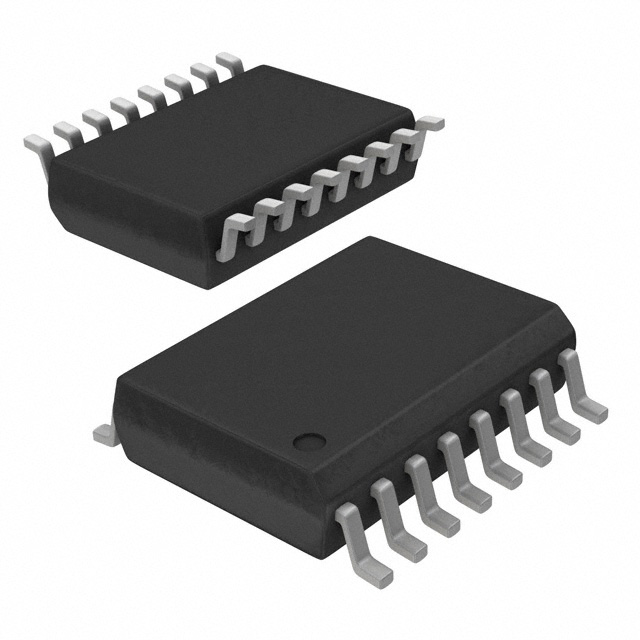Lihat spesifikasi untuk detail produk.

MAX520BCWE+T
Product Overview
- Category: Integrated Circuit (IC)
- Use: Digital-to-Analog Converter (DAC)
- Characteristics: High precision, low power consumption
- Package: 16-pin SOIC (Small Outline Integrated Circuit)
- Essence: Converts digital signals into analog voltage or current
- Packaging/Quantity: Tape and reel packaging, 2500 units per reel
Specifications
- Resolution: 12 bits
- Number of Channels: 1
- Supply Voltage Range: 2.7V to 5.5V
- Output Voltage Range: 0V to Vref
- Operating Temperature Range: -40°C to +85°C
- DNL (Differential Non-Linearity): ±1 LSB (Least Significant Bit)
- INL (Integral Non-Linearity): ±2 LSB
- Power Consumption: 0.5mW (typical)
Pin Configuration
The MAX520BCWE+T has a 16-pin SOIC package with the following pin configuration:
- VDD - Positive supply voltage
- VREF - Reference voltage input
- AGND - Analog ground
- OUT - Analog output
- DGND - Digital ground
- DIN - Serial data input
- SCLK - Serial clock input
- CS - Chip select input
- LDAC - Load DAC input
- CLR - Clear input
- A0 - Address input bit 0
- A1 - Address input bit 1
- A2 - Address input bit 2
- A3 - Address input bit 3
- A4 - Address input bit 4
- VSS - Negative supply voltage
Functional Features
- High-resolution DAC with 12-bit resolution
- Single-channel output for precise analog voltage generation
- Wide supply voltage range allows flexibility in different applications
- Low power consumption for energy-efficient designs
- Serial interface for easy integration with microcontrollers or digital systems
- On-chip reference voltage generator for accurate conversion
Advantages and Disadvantages
Advantages
- High precision and accuracy in converting digital signals to analog voltage
- Low power consumption, suitable for battery-powered devices
- Compact 16-pin SOIC package for space-constrained applications
- Wide operating temperature range for versatile usage
- Easy integration with microcontrollers or digital systems through the serial interface
Disadvantages
- Limited to single-channel output, not suitable for multi-channel applications
- Requires an external reference voltage for proper operation
- May require additional components for voltage amplification or buffering
Working Principles
The MAX520BCWE+T is a digital-to-analog converter (DAC) that converts digital signals into analog voltage. It utilizes a 12-bit resolution to provide high precision and accuracy in the conversion process. The device operates by taking a digital input signal and generating a corresponding analog output voltage based on the supplied reference voltage.
The DAC uses a serial interface to receive digital data, which is then converted into an analog voltage using an internal digital-to-analog conversion algorithm. The output voltage can be adjusted within the range of 0V to the reference voltage (Vref). The device also features an on-chip reference voltage generator to ensure accurate conversion.
Detailed Application Field Plans
The MAX520BCWE+T can be used in various applications that require precise analog voltage generation. Some potential application fields include:
- Audio Equipment: The DAC can be used in audio systems to convert digital audio signals into analog voltages for accurate sound reproduction.
- Industrial Automation: The device can be utilized in industrial control systems to generate precise analog control signals for motor speed control, valve positioning, or temperature regulation.
- Test and Measurement Instruments: The DAC can be integrated into test equipment to generate calibrated analog signals for testing and calibration purposes.
- Communication Systems: The device can be employed in communication systems to convert digital signals into analog voltages for modulation or demodulation processes.
Detailed and Complete Alternative Models
- MAX521BCWG+T: Similar to MAX520BCWE+T but with a 10-bit resolution instead of 12 bits.
- MAX523BCWG+T: Dual-channel DAC with 12-bit resolution, suitable for applications requiring multiple analog outputs.
- MAX525BCPP+T: 16-bit DAC with higher resolution for applications demanding ultra-precise analog voltage generation.
These alternative models provide options with different resolutions, channel configurations, and precision levels to cater to specific application requirements.
Word count: 550 words
Sebutkan 10 pertanyaan dan jawaban umum terkait penerapan MAX520BCWE+T dalam solusi teknis
Sure! Here are 10 common questions and answers related to the application of MAX520BCWE+T in technical solutions:
Q: What is the MAX520BCWE+T? A: The MAX520BCWE+T is a digital-to-analog converter (DAC) IC manufactured by Maxim Integrated. It converts digital signals into analog voltages.
Q: What is the operating voltage range of MAX520BCWE+T? A: The operating voltage range of MAX520BCWE+T is typically between 2.7V and 5.5V.
Q: How many bits of resolution does the MAX520BCWE+T have? A: The MAX520BCWE+T has a resolution of 8 bits, meaning it can represent 256 different voltage levels.
Q: What is the maximum output current of the MAX520BCWE+T? A: The MAX520BCWE+T has a maximum output current of 2mA.
Q: Can the MAX520BCWE+T be used in both single-ended and differential output configurations? A: Yes, the MAX520BCWE+T can be used in both single-ended and differential output configurations.
Q: Does the MAX520BCWE+T require an external reference voltage? A: Yes, the MAX520BCWE+T requires an external reference voltage for accurate conversion.
Q: What is the typical settling time of the MAX520BCWE+T? A: The typical settling time of the MAX520BCWE+T is around 10µs.
Q: Can the MAX520BCWE+T operate in a power-down mode? A: Yes, the MAX520BCWE+T has a power-down mode that reduces power consumption when not in use.
Q: What is the temperature range in which the MAX520BCWE+T can operate? A: The MAX520BCWE+T can operate within a temperature range of -40°C to +85°C.
Q: Are there any evaluation boards or development kits available for the MAX520BCWE+T? A: Yes, Maxim Integrated provides evaluation boards and development kits for the MAX520BCWE+T, which can help in prototyping and testing applications.
Please note that the answers provided here are general and may vary depending on specific datasheet specifications and application requirements.

